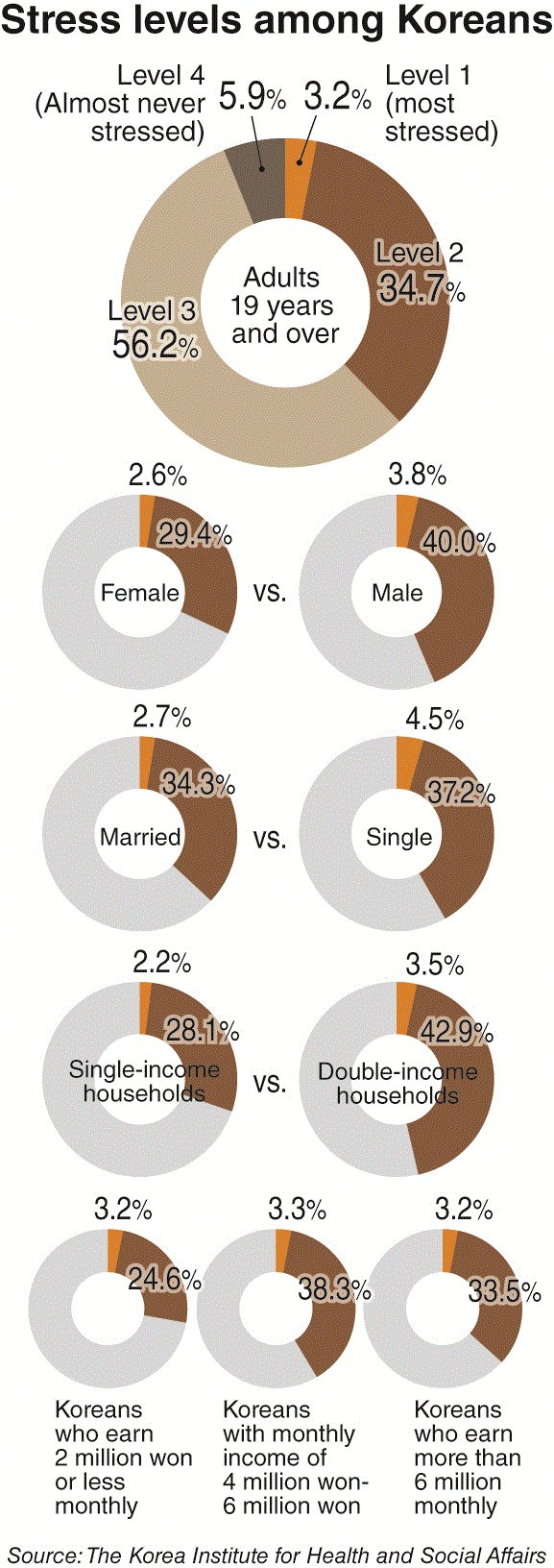High earners and men tend to be more stressed than low-earning workers and women in South Korea, while more than 90 percent of all adult Koreans felt stressed on different levels, a study showed Monday.
The report, published by the Korea Institute for Health and Social Affairs, interviewed 7,000 Koreans aged 19 or older in person last year. Researchers asked the participants to rate their level of stress on a scale of 1-4, with 4 being the highest level and 1 being the lowest (almost never stressed).

It showed that 37.9 percent of the surveyed Koreans rated levels 3 and 4, while 56.2 percent picked level 2. Altogether, 94 percent of the participants said they were experiencing stress with various levels of intensity.
“The fact that almost 40 percent of adult Koreans are experiencing high levels of stress shows that many of them are experiencing conflicts and problems at home and work,” the researchers noted. “One of the stressors could be also limited job security and unemployment, among other things.”
The research also found that high earners, men and those who belong to double-income households are more vulnerable to stress.
While 43.8 percent of the male participants rated their stress levels as 3 and 4, only 32 percent of the surveyed women said the same.
Among those who made 2 million won ($1,660) monthly or less, 27.8 percent answered they tended to, or definitely, felt very stressed, compared to 37.9 percent who said the same among those who made 6 million or more.
The comparative figure was 38.6 percent for those who make between 2 and 4 million won, and 41.6 percent of those who make 4 to 6 million won.
Also, dual income married couples were more stressed than single-income couples, the study showed. While 46.4 percent of double-income couples rated the intensity of their stress as levels 3 or 4, 30.3 percent of single-income households rated the same.
Interestingly, the study found that married couples, regardless of their income, were less stressed than Koreans who are single; while 37 percent of married Koreans rated their levels as 3 or 4, 41.7 percent of single Koreans did the same.
The study also surveyed a total of 1,665 teenagers aged 14-18 who have been bullied at school. Among them, 40.9 percent said they were very stressed because of the experience, while 31.6 percent said they were extremely stressed while being bullied. Notably, 66.7 percent of them said they had no one to speak to about the experience, and no one has ever noticed their problem or volunteered to help.
Although the KIHASA did not provide statistics on adult Koreans who have been bullied at work, another study by Saramin, an online recruitment website, showed in 2012 that 45 percent of 2,975 working Koreans who participated in the research said they had a coworker who was bullied. Among them, 61.3 percent said the bullying problem was very serious, and 58.3 percent said they had a colleague who quit their position after being bullied.
According to the OECD data last year, 28 percent of Koreans said they have no meaningful social support at all — not a single person they can rely on — in times of crisis. This rate was the highest among the Organization for Economic Cooperation and Development nations.
As of last year, South Koreans worked the second-longest hours among OECD countries. The country is also notorious for its high suicide rate — the highest in OECD — with up to about 40 people taking their lives every day.
By Claire Lee (dyc@heraldcorp.com)

